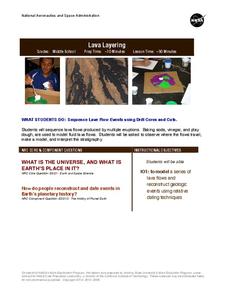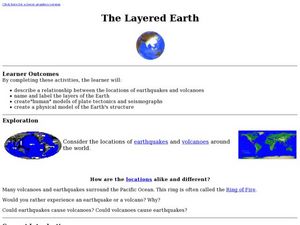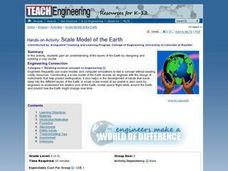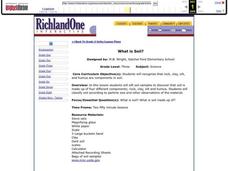Baylor College
Modeling Earth's Atmosphere
Life on Earth is made possible by the unique composition of its atmosphere. Working collaboratively, a scale model is created as young scientists learn about the different layers of gas that surround the planet. Cards are included that...
Alabama Learning Exchange
The Earth Has Many Layers
Students conduct an experiment. In this Earth's layers lesson, students learn about soil, sand and rock. They complete their own Jell-O Mountain and investigate the Earth's layers on-line.
Curated OER
Planet Earth in Cross Section
Students will examine the layers of the Earth. In this geology lesson, students create a scale model of the Earth's interior using cash register tape. They will determine the percentage of error in the scale compared to the actual size...
Curated OER
How Old Is Illinois?
High schoolers use fossils found in rocks to determine the age of the strata between Rock Island and Chicago. Pupils pretend they are geologists. They must determine the age of all rock layers between the Mississippi River and Lake...
NASA
Lava Layering
Take the old baking soda and vinegar volcano to the next level by using it to study repeated lava flows over time, examine geologic features on Earth and Mars, and speculate about some of the formations on Mars.
Curated OER
Layers of the Earth: Plate Tectonics
Sixth graders participate in a lesson that is about investigating the different layers of the earth and defining how the plates move over the mantle. They engage in a variety of activities and use mathematics to create projects to...
Curated OER
Identifying Ozone Variations over Different Locations
Students analyze ozone data. In this atmosphere lesson, students will use a NASA resource to gather data for different regions of the Earth. Students will then create a graph for their data and answer related questions.
Baylor College
Fossil Fuels and the Carbon Cycle
Humans are quickly depleting Earth's fossil fuels and locating them is becoming increasingly difficult! Layered muffins are used for models as young geologists take core samples in order to determine the presence of oil. Consider first...
Curated OER
Wave Math
Students identify the different factors affecting the size and shape of ocean waves. In this math lesson, students calculate wave speed and wavelength given a mathematical formula.
Curated OER
How Big Are Earth, Sun, and Moon?
Third graders draw what they believe is in space on a dry erase board. In groups, they are given a beaker half filled with water and they add a teaspoon of oil, observing the different layers that form. To end the lesson, they identify...
Curated OER
Interior of the Earth
Sixth graders identify and describe the composition and physical properties of the layers of the Earth. They also explain how scientists used the scientific process to know about the center of the Earth. Finally, 6th graders read a...
Curated OER
Layering the Air
Young scholars study the layer of the atmosphere. In this activity on the atmosphere, students discuss the composition of the air around us and how the atmosphere was formed. Young scholars create a scale model of the layers of the...
Curated OER
Plate Tectonics: An "Eggs"periment
Learners investigate plate tectonics by observing a cracked egg shell. In this Earth science lesson, students draw borders of continents on an egg shell, only to watch it crack in a glass. Learners record the breakup of the...
Curated OER
Mighty Earth Movers
Note that although the publisher lists almost all of the Common Core standards for both math and language arts, you will most likely want to take the general topic and choose which area to focus on. Regarding math, pupils measure worms...
Curated OER
Roman Archy
Third graders use Google Earth to examine Roman architecture. In this ancient Rome lesson, 3rd graders visit the noted URLs to look at examples of Roman architecture. Students work in teams to examine data about the structures.
Curated OER
The Layered Earth
Students role play plate tectonics by creating a "plate statue" made up of students. In this earth science lesson, students describe how Earth's movement cause earthquakes and volcanoes. They draw and name the different layers of the Earth.
Curated OER
Scale Model of the Earth
Students work together to create a model of the Earth. They label and identify each layer and describing its properties. They discover how engineers use models to test different concepts.
Curated OER
Soil Scrolls
Third graders examine soil samples and explore the what happens in each layer of the subsoil. They work in cooperative groups to create a scroll that shows what takes place in each layer, and discuss why much of the activity is in the...
Curated OER
Greenhouse Effect: Pop Bottle Experiment
Students explore global warming by conducting a weather experiment. In this greenhouse gas lesson, students define the greenhouse effect and the impact on our ozone layer. Students utilize a soda pop bottle, floodlight bulb, thermometers...
Curated OER
Trouble in the Troposphere
Students Use data sets from MY NASA DATA to produce graphs comparing monthly and yearly ozone averages of several U.S. cities. They analyze and evaluate the data and predict trends based on the data. In addition, they discuss and...
Ocean Explorer
Living with the Heat
Young oceanographers study the Submarine Ring of Fire, which is a series of deep-water volcanic vents that come up from the ocean floor. Learners take a close look at the unique ecosystems that are associated with these areas, how these...
Curated OER
Plate Tectonics: Kindergarten Lesson Plans and Activities
This unit focuses primarily on plate tectonics and plate boundaries surrounding continents. It contains pre- and post-lab sections that walk young geologists through plate movements in order to visualize what's going on inside Earth.
Curated OER
Planet Structure & Interior
Pupils compare Jupiter and Earth. In this Earth and space studies instructional activity, students compare the composition of Earth and Jupiter and analyze how the composition affects the rate at which the planets spin.
Curated OER
What is Soil?
Third graders examine what makes soil by creating a Venn Diagram. In this Earth environment activity, 3rd graders identify the different components that soil is made from. Students bring soil from their homes to examine and create...























